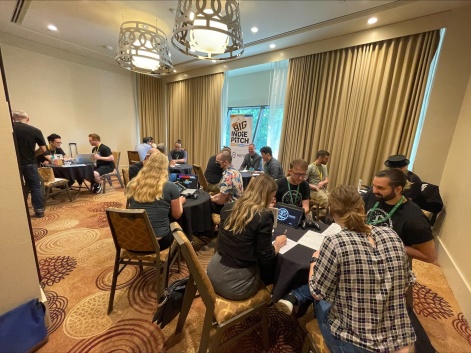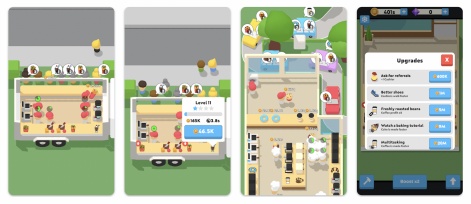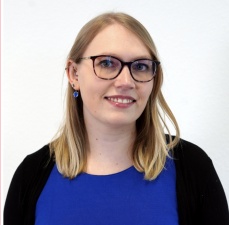The Big Indie Pitch, a regular event run by the makers of PocketGamer.biz, sees indie developers engage in a rapid-fire pitching competition for fame and those sweet promotional packages.
The event gives indies four minutes to pitch their games to a panel of press, publishers, and industry pundits, each receiving invaluable feedback, before the judges pick three winners.
The indie view
The Big Indie Pitch is getting bigger and bigger as we bring it across the world. We've sat down with a number of past BIP contestants to offer their views on the event, its attendees, and the games on show.

Today, we're speaking to Sophie Brügmann from Lessmore, who created and pitched Eatventure, at The Very Big Indie Pitch at Pocket Gamer Connects Helsinki 2022 and walked away with the second place prize.
Sophia Aubrey Drake: Tell us a little about yourself and your indie studio - who's on the team, and what are their inspirations?
Sophie Brügmann: Thank you so much for having us. We are Lessmore. We are a new vibrant mobile games studio and all work remotely. Our task splits cover the standards – development, game design, marketing, community management, and operations. The three founders are an equal, hands-on part of the team.
What’s unique about Lessmore as a company is that we are super-fast and iterate quickly, with each team member bringing many years of mobile expertise to the table.
Another fun fact is that we do not have a dedicated art team. We are proud of our real, organic, home-grown developer art.
Where do we get inspiration? Our main company value is already incorporated in the name itself: Lessmore, less is more. We always look for the biggest bang for our buck at any given time, meaning setting priorities right. Everyone is encouraged to make their own decisions, try out what works, succeed or fail fast and learn from it. Personally, I feel this value is an inspiration, it inspires me to believe in my skill set, and it pushes me forward every single day.
Tell us about Eatventure that you pitched at the competition.
Eatventure is a hybrid casual mobile game in the spheres of the idle simulation genre. It starts off very simple, without much text, so that anyone can just install it and play. We put a lot of emphasis on making the experience as smooth and intuitive as possible.
In Eatventure, you go on an adventure with the goal of becoming a successful restaurant owner. In the beginning, you’ve got your tiny little lemonade stand. And as money is tight, obviously the drinks get prepared and sold by yourself. As you progress, sell more and more lemonades, and make more and more money, you can afford to buy a drive-in – and now also sell delicious burgers.
We aim towards for our visuals to tell stories without requiring textSophie Brügmann, Lessmore
Maybe one day, your dream of sitting by the beach, and having many employees in your amazing high-quality restaurant, could become true.
We are always happy to hear about our players’ Eatventures, so feel free to download the game here and send us your thoughts.
What do you think are the most unique and interesting aspects of Eatventure that gamers may never have seen before.
Firstly, Eatventure starts off as a traditional hyper casual game: easy to get started, no long texts, no big tutorial. It’s strong moment-to-moment gameplay, and that is different from many other mobile games. We then add strategic elements, one by one, to be sure players can join us on our journey and transfer from hyper-casual to casual seamlessly.
We give the players things to do, invite other chefs into the restaurants, and build up their special skills vault. Also, there are regular events, where competitive players can show off their talents and earn badges (and their place on the leaderboards).
Secondly, as part of creating this unique experience, we aim towards our visuals telling stories without requiring text. The food icons and overall artworks are simplistic, yet very distinct.
And third, how many people can say they opened their own bar?
For the adventurous adults – at some point, you can sell not only lemonade but also refreshing spicy apple juice. Shaken, or stirred.
Eatventure is a hyper-casual restaurant tycoon sim. What made you choose this genre, and what do you think you bring to it that may not have been seen before?
It is a great genre because anyone can simply play. There’s no rulebook to study, and no explanations are required by a person either. So, it’s very open, we reach a broad audience.
And with that, we also receive a multitude of feedback and perspectives, which we can then consider for our next updates. What makes this game different from others is the people behind it. Our production team is super-fast, like hyper-super-fast. We can shoot out updates and create prototypes and enticing event levels rapidly. That’s what makes Eatventure special.

How did you come to choose the platforms that you would develop Eatventure for?
Simply put, the major platforms in Europe are the Google Play Store and the Apple Store. We started off with the Android version and then created one for iOS as well. We’d like to include as many players as possible and feel this is the easiest way to do so. In the future, we aim to also make our game accessible to the Asian market as well. Everyone should be able to sell their apple juice.
Looking at the studio a little more now. How hard is it to survive as an Indie developer?
It’s tough. Every studio has its own strengths and weaknesses, so the individual challenges depend highly on the people, who are part of the studio. For us, the founders have their core experience on the design and programming front. Therefore, they know how to come up with creative ideas, which ones to prototype quickly and how to test whether to continue or not. So here, the business side was more difficult initially, having to deal with finance and admin work whilst making games.
Once the team is set up with all required competencies covered, it gets easier. However, initially, it’s tough having to be a jack of all trades in so many different areas. If money does not come in as expected, there are additional constant thoughts around pitching and investment rounds. We’ve been very lucky to have found like-minded, highly motivated, and passionate people, who do a kickass job.
Are there any tips and advice you would give to an independent developer out there who are just starting out?
Is your team strong with being creative? Do not neglect the business side of things.
Is your team strong with being business-y? Do not neglect the creative side of things.
Both are vital, very early on. And get support – talk to other developers in the industry. Knowledge exchange is important and always beneficial.
How did you find your experience pitching as a part of the Big Indie Pitch?
It’s been nerve-wracking and exciting at the same time. Great to catch up with experienced professionals from the industry. Even though I’ve personally worked in games for quite a while now, it’s always special to receive feedback from a new person that has never played your game before. Getting to collect their thoughts and ideas for little tweaks is one of the most valuable resources to receive.
It’s important to stay hands-on with the development of your game, even if not directly on the product as a programmerSophie Brügmann, Lessmore
To share a little story on why this very Big Indie Pitch was also a personal milestone:
Years and years ago I worked in a different company, on a different mobile game in the idle space, and I pitched said game to a juror. This was pretty much at the beginning of my career.
And one of the jurors, who was sitting right there in front of me in Helsinki, was the same person I had pitched to so many years ago. Whilst not remembering it was me, he did remember there was a pitch with my handwriting on it, some time ago. How cool is that?
What do you feel you have gained from the experience, and what do you still hope to gain?
It’s important to stay hands-on and involved in the development of your game, even if not directly working on the product as a programmer. Personally, it was a great honour being trusted by the team to pitch Eatventure, even though my own role is fully on the operational side of the business. Every person has their share and adds their contribution to the games and studio’s success.
Hope to gain more opportunities for everyone, to get into situations that aren’t “the usual day-to-day”. To be positively pushed past boundaries, break limits that were seen as impossible before. Attend events, give talks, do pitches, and have lots of fun.
What are your hopes for this game in the future, and do you have any plans for any future projects?
Most of our team members work in development. Some on improving our existing titles, with a focus on Eatventure. And others, in our so-called F1 department (yes, they do love formula one). They work on prototyping and finding new cool ideas for future games. Game Design also works very closely with the developers, to come up with exciting levels, features, or suggestions for polish. Keep an eye out on our website and store pages, you might find new things soon.
Want to show off your exciting new game? We host Big Indie Pitch events throughout the year, so be sure to keep an eye out on our events page for an event near you, or even our new Digital pitches.
All our upcoming pitches including how to enter can be found over on our upcoming events page on BigIndiePitch.com.
Get the latest news, interviews and in-depth analysis on Twitter, Facebook, and our daily newsletter.





















